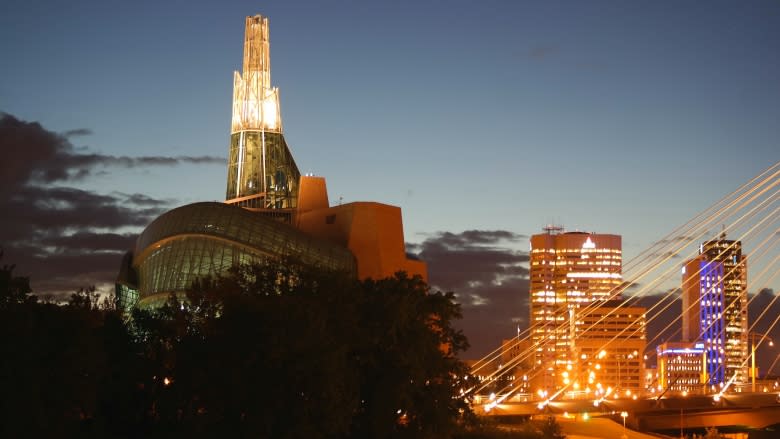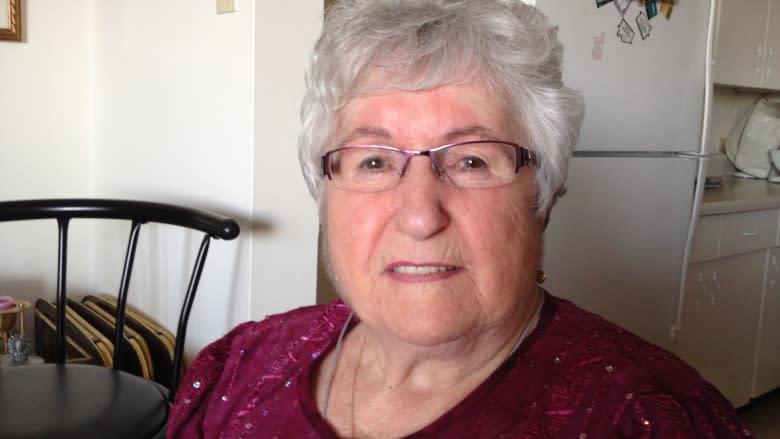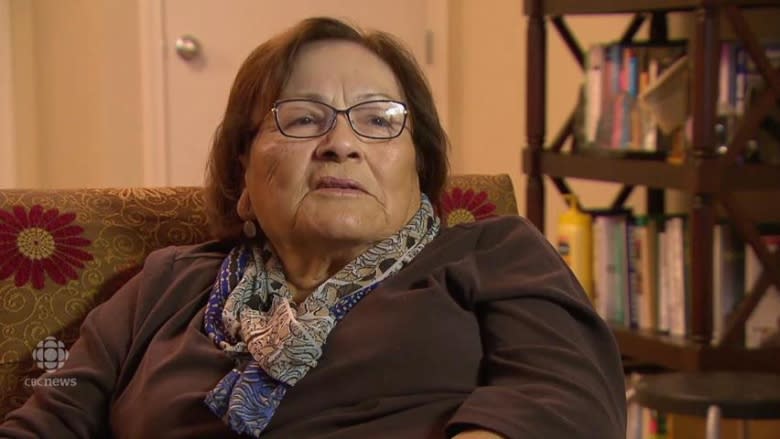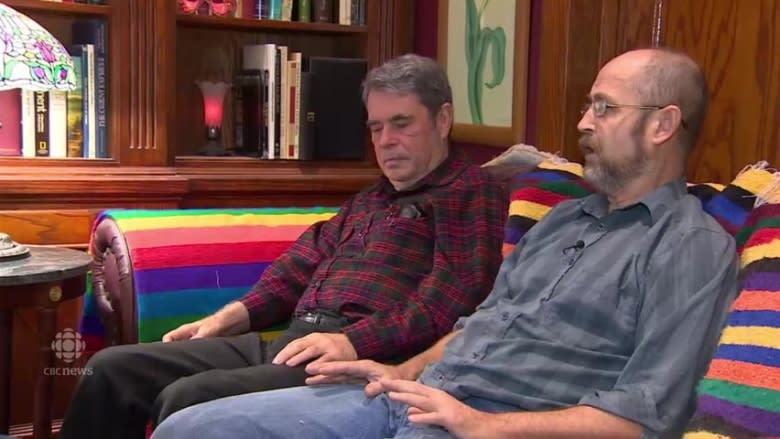6 stories from the Canadian Museum for Human Rights
With the Canadian Museum for Human Rights officially opening this weekend, CBC News shares six stories from inside and outside the museum's walls.
Click on the video players below to to watch Meagan Fiddler's profiles of Carmela Finkel, Mary Courchene, Chris Vogel and Richard North, and Ali Saeed.
We also talk to the sister of Viola Desmond, an early Canadian civil-rights activist, and Mareshia Rucker, who helped end a tradition of segregation at her U.S. high school last year.
Carmela Finkel
Carmela Finkel says she's lucky to be alive today to share her experience from the Holocaust at the Canadian Museum for Human Rights.
Finkel's family spent 20 months hiding in a bunker under a neighbour's house in Poland during the Second World War.
She was nine years old when she went into hiding. She emerged when she was 11, unable to speak and use her muscles.
"It was a very traumatic part of my life, something I'll never forget," she said.
"But I feel very strongly that it's something that should be heard because we have to make sure that it doesn't happen — I mean, it's happening all over the world."
Eventually Finkel and her family fled to Germany, where they were greeted by American soldiers.
- ON MOBILE? Watch Meagan Fiddler's full profile of Carmela Finkel here.
Mary Courchene
Mary Courchene says the 10 years she spent in a residential school were the worst 10 years of her life.
She was forced to attend Fort Alexander Indian Residential School No. 96 starting at the age of five. She was not allowed to go home to her parents during the school year, even though her home was just next door.
Her story is not documented at the Canadian Museum for Human Rights but galleries within the museum do include stories from former students and details about the Canadian government's apology to survivors.
Courchene said it's important for the public to hear the residential school stories that are in the museum but said it could go further.
"They're shying away from saying that it was a genocide. I think it's up to us, up to the people, to say whether or not it was. And for me, it was," she said.
Museum officials have said it's not a court or an academic institution, so the term "genocide" is used only in relation to the five cases recognized by the Canadian government.
- ON MOBILE? Watch our profile of Mary Courchene here.
Chris Vogel and Richard North
Chris Vogel and Richard North are the first gay couple to try and legally marry in Canada.
Their marriage certificate, granted by the Unitarian Universalist Church of Winnipeg in 1974, was one of the first same-sex marriage certificates issued in Canada.
However, their union was not recognized by the province.
- CBC Digital Archives: Gay Winnipeg couple marries (As It Happens, 1974)
They launched a decades-long legal battle to challenge marriage laws and fight for same-sex spousal benefits.
North said he hopes others won't have to go through the struggle they've endured.
"Our marriage certificate, hopefully, is a beacon of hope. The museum will be part of the process of changing the way the world sees homosexuality," he said.
Their story, along with their marriage certificate, can be found in the museum's Canadian Journeys gallery.
- ON MOBILE? Watch our profile of Chris Vogel and Rich North.
Ali Saeed
Ali Saeed can tell you personally about terror and torture: during a period in the late 1970s called the Ethiopian Red Terror, he was captured from his home in Ethiopia and tortured. He was hung upside down and his feet were whipped and cut.
When he was finally released, Saeed fled to Somalia, only to be captured and tortured again.
In total, he spent more than seven years in 11 different prisons.
Now living in Winnipeg, which he calls his safe haven, Saeed is telling his story in the human rights museum's Breaking the Silence gallery.
He said he's sharing his experience because millions of people are currently in captivity around the world.
"I have responsibilities to my comrades. They just keep the struggle and fight for the right of [women], fight for the freedom of speech, fight for the right to walk free and stand for justice," he said.
- ON MOBILE? Watch our profile of Ali Saeed here.
Viola Desmond
Nine years before Rosa Parks refused to give up her seat on a bus in Alabama, a Canadian woman named Viola Desmond stood up against racial segregation in a Nova Scotia movie theatre.
In 1946, Desmond was jailed and fined for refusing to give up her seat in the whites-only section of a New Glasgow, N.S., theatre.
Desmond, who owned a hairdressing business, fought unsuccessfully to appeal both her conviction and fine.
Her court battle started the dismantling of Nova Scotia's segregation laws and inspired civil rights activism in Canada.
"She was an educated, wonderful woman who thought that everybody deserved a chance in this world, and people should not be looked down upon because of the colour of their skin," said her sister Wanda Robson.
In 2010, Desmond received a posthumous pardon from the Nova Scotia government.
In 2012, she was featured on a commemorative stamp from Canada Post. And earlier this year, Nova Scotia observed a statutory holiday named after her.
- VIDEO: Wanda Robson talks about the legacy of her sister, Viola Desmond.
Mareshia Rucker
In 2013, Mareshia Rucker helped organize the first integrated high school prom in the U.S. state of Georgia.
That meant for the first time in the school's history, black and white students could attend the prom together.
Previously, separate proms were held for Caucasian students and African-American students.
"We only get to graduate once … so we felt like it made sense for us to have prom together because we did everything else together," she told CBC News via Skype.
Rucker said it's an honour to see her school's achievement featured at the museum.
- VIDEO: Mareshia Rucker describes why she helped organize an integrated prom.






